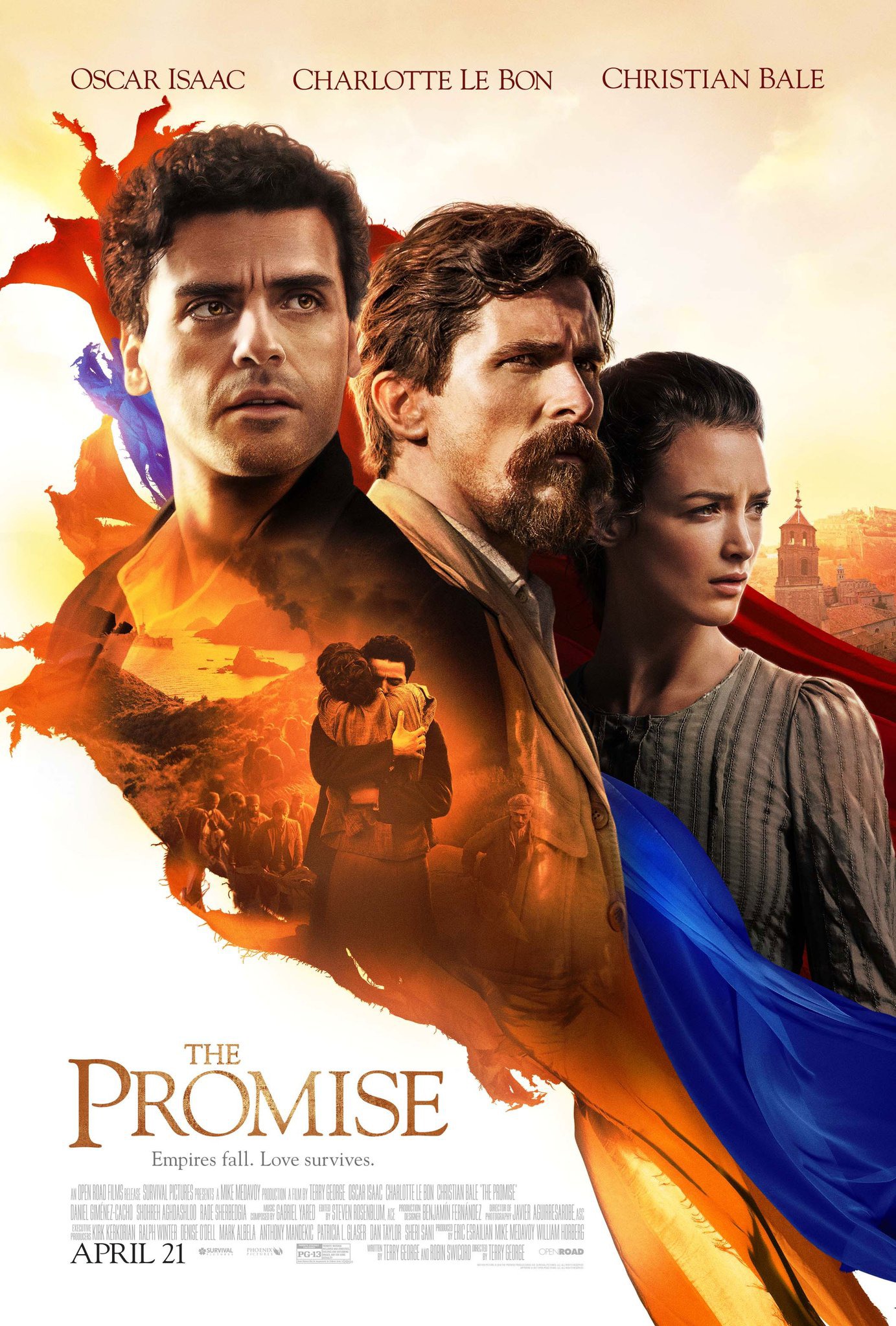
In 2017, a movie titled The Promise was released. Filmed upon the will of Armenian billionaire businessman Kirk Kerkorian with a 90-million-dollar budget, it portrayed the 1915 Events based upon the genocide allegations. It was directed by award-winning director Terry George and the starring roles were played by the renowned actor Christian Bale and the up-and-coming actor Oscar Isaac, while its end credits song was composed and sung by the renowned rock musician Chris Cornell. The Promise currently stands as the highest budget genocide allegations-themed movie of all time.
An intense promotion campaign was carried out for the movie both before and after its release.[1] However, despite all the promotion attempts, people began to realize that the movie was going to not only fail in terms of box office revenues, but was also not going to be liked by the movie critics. The movie failed to garner the desired praise from critics even in places where Armenian lobby groups are predominant (such as Los Angeles, the heart of the movie industry). For a long time, it was not possible to obtain current box office revenue information about the movie. At that time, the only information available was that the movie earned 8.2 million dollars in revenue in the US, which was the first market where it was released.
We now see that, in the time that has passed since then, the box office revenue information about the movie has finally been updated. According to current data, the 90-milion-dollar budget movie was only able to earn 12.4 million dollars of box office revenue worldwide.[2] According to information gathered from various movie review platforms, the critics’ common opinion of the movie is that it is “mediocre”.[3] An intense support campaign was run by various groups targeting the movie’s audience score. As such, the average audience score of the movie is exceedingly high, which is far from believable. By the comments posted by regular viewers, it can be gathered that the high score of the movie, rather than being based on its artistic content, is based on the audience’s satisfaction with the movie giving space to the genocide allegations.
If the eye-washing attempts concerning the movie are left aside, a 90-million-dollar budget movie earning only 12.4 million dollars would be considered a disaster in the movie industry. If we consider that the movie was not liked by the critics as well, The Promise can be considered as a fiasco in every respect. It can be said that this failed movie will remain as a black stain in the otherwise bright careers of Terry George, Christian Bale, and Oscar Isaac.
In this sense, The Promise has shared the same fate as the other genocide allegations-themed movies.[4] For example, Ararat (the Ağrı Mountain in Turkey), filmed by Atom Egoyan in 2002, La masseria delle allodole (Eng. The Lark Farm) filmed by Paolo and Vittorio Taviani in 2007, and Kesik (En. The Cut) filmed by Fatih Akın in 2017 are all considered unsuccessful movies in the artistic sense. The common cause of failure of these movies might be that they seek to reflect complicated historical issues such as the 1915 Events and the Armenian Relocation and Resettlement with forced scenarios and a propagandist approach. In a similar fashion, The Promise has tried to handle such serious issues through a cliché love triangle story.
However, The Promise is still valuable for groups carrying out propaganda about the genocide allegations due to these following points:
1) Even though The Promise looks like a work of art, the way in which movie was filmed and the explanations provided about it reveal that the movie is essentially a work of propaganda.[5] It should be kept in mind that, although the movie is considered a fiasco both commercially and artistically, it will influence the perception of the audiences, especially the ones who are not informed about the said historical issues. Some of the viewers of the movie have posted comments such as “I did not know anything about Armenian genocide before I watched this movie” or “I am hearing about the Armenian genocide for the first time”. So, no matter how mediocre The Promise is, it has succeeded in inserting propaganda into the minds of uninformed viewers. It should also be noted that this movie is being shown in schools and academic debates are being conducted about it as if it is a documentary.[6] Thus, an academic quality is sought to be instilled upon this propaganda movie.
2) Since the people mentioned alongside The Promise; Terry George, Christian Bale, Oscar Isaac, and Chris Cornell, are celebrities, the movie automatically attracts the attention of the viewers. In this period in which the Internet and social media have made people lazy about gathering accurate information, the things that celebrities say are taken seriously by many people even though these celebrities have no expertise on the issues that they talk about. Kim Kardashian (reality show star and businesswoman of Armenian descent), who has in recent times stood out with her anti-Turkey demeanor, has latched on to the propaganda of the genocide narrative to maintain her fame. In this context, it should be noted that she was welcomed by state officials during her visit to Armenia (this points to the importance given by Armenia to Kardashian for her being an element of propaganda). Renowned TV and movie actor George Clooney has throughout the years also adopted the genocide narrative and engages in activities to further its cause at every opportunity. His wife of Lebanese descent Amal Clooney, who is a well-known lawyer, had made an unsuccessful defense for the side of Armenia during Perinçek vs. Switzerland case seen at the ECtHR. The content of her defense was irrelevant to the essence of the case and aimed only to denigrate Turkey. However, her defense has been portrayed as if she achieved great success. Lastly, Christian Bale has joined this genocide narrative’s propaganda bandwagon as well. Without having any knowledge on the issue, he has repeated the well-known cliché statements that support the genocide narrative.[7] It is obvious that the element of popularity is used as means to compensate for the weaknesses of the genocide narrative, which is known to be unfounded both in terms of historical facts and legal considerations.
3) If its overall box office revenue is considered, the movie has been watched by a significant amount of people in some markets. For instance, the movie earned 505,000 US Dollars in revenue in Spain, which has good relations with Turkey and in which the Armenian diaspora does not have much of a presence. In Australia , in which Armenian lobby groups have carried out intense propaganda but have failed to get the desired results (good relations between Turkey and Australia plays an active role here), the movie has managed to earn 410,000 US Dollars. Thus, the movie has earned more revenue in these two markets than in France (373,000 US Dollars), one of the countries in which the Armenian diaspora is most active. This means that, due to this movie, the propaganda of the genocide narrative has successfully been inserted into the minds of many viewers in Spain and Australia. Yet, from another perspective, this raises questions on the reasons why the movie was watched by relatively fewer people in France, a country in which half a million people of Armenians descent live and where the Armenian diaspora is very well-organized. To make a comparison, the movie earned 208,000 US Dollars in revenue in Lebanon, which has a population of 6.9 million and a strong Armenian diaspora.
Even though The Promise is a 90-million-dollar fiasco both financially and artistically, this does not mean that groups carrying out the propaganda of the genocide narrative are going to give up. The movie has an obvious propaganda value despite all its shortcomings. As such, these groups are expected to continue -without slowing down- their propaganda activities under the guise of producing art.
For Armenia and especially for the Armenian diaspora, the genocide narrative concerning the 1915 Events is an obsession. Millions of dollars are spent every year to impose this obsession onto other people. For the sake of this obsession, countless journals and books, conferences, and documentaries with dubious academic quality or fraudulent content have been respectively published, organized, and filmed. The Promise is only a part of such activities. There are many organizations, academics, and celebrities around the world who are trying to capitalize on the money that is being thrown around in this process. The statements on genocide by George Clooney or Christian Bale should be understood in this context.
While carrying out propaganda for the genocide narrative, the Armenian diaspora and Armenia are also making an intense effort to silence the opposing side. These two actors and the groups that act in concert with them claim they wish to talk with the Turks on “truth and justice” by emphasizing positive concepts such as democracy, human rights, and freedom of expression. However, in truth, they aim to engage in a monologue rather than dialogue and impose their views upon the Turks. In this context, academics who reject the genocide narrative are harassed and the publication of opposing academic works is sought to be prevented. On the other hand, some of the prestigious publishing houses that have published works that put forth the genocide narrative through questionable means remain silent despite all the criticism that they have received. Resolutions that envisage the penalization of opposing ideas are sought to be adopted in foreign parliaments, and Turkish identity is sought to be systematically humiliated. The aim is to make Turkey and the Turks feel ashamed of their past and to deprive them of the right to defend themselves. Despite the Armenian diaspora and Armenia portraying themselves as victims struggling against a bully, it is themselves who end becoming the bullying side.
This aggressive attitude is so exaggerated that trouble is made even from issues which have no relevance with the 1915 Events. As an example, the movie Water Diviner, directed by renowned actor Russell Crowe in 2014, tells the story of an Australian father who travels to the Ottoman Empire to learn the fate of his sons who had joined the Battle of Çanakkale (Gallipoli) around 1915. The movie covers the ugly aspects of war and the traumas that soldiers face during battle. Moreover, Turks are portrayed as normal people who are trying to survive just like everyone else. Based on its subject, the movie has nothing to do with the Armenians. However, the movie faced boycott campaigns by various Armenian diaspora groups simply because it takes place in Anatolia around 1915 and does not mention the Armenians.[8] In short, these groups have no tolerance for Turks being depicted even neutrally, let alone positively.
Faced with such irrational hostility, it is only natural for Turkey to have the right to defend itself as a whole with its government agencies, non-governmental organizations, and academics. Trying to silence Turkey by accusing it of “denialism” and wanting Turkey to concede to this situation is an unrealistic expectation. Within this context, works on this issue in Turkey should be continued with increasing quality and quantity.
Lastly, there is a point that must be made about the state of Armenia. As known, Armenia has been a country that has struggled with various infrastructural problems and has suffered regular population loss due to economic difficulties since it achieved its independence in the 1990s. In this sense, Armenia has fallen back in terms of development in comparison to the other the Southern Caucasian countries; Georgia and especially Azerbaijan. Armenian diaspora organizations claim to defend Armenia’s interests and, in this context, intervene in Armenia’s internal affairs. Would it not have been better if financial aid was transferred to resolve Armenia’s infrastructural problems instead of filming a 90-million-dollar mediocre movie that spews hatred against Turks? How many roads could have been paved, how many schools could have been constructed, how many businesses could have been supported with such money? Unfortunately, an obsession on a single subject pushes people to engage in such irrational acts.
* This is the English translation of an article originally published in Turkish on 8 July 2020. AVİM Trainee Sezin Atar contributed to the translation of this article.
[1] Sean Patrick Smyth, “Movie Wars: The Tale of Two Narratives,” Center for Eurasian Studies (AVİM), Analysis No: 2017/23, June 23, 2017, https://avim.org.tr/en/Analiz/MOVIE-WARS-THE-TALE-OF-TWO-NARRATIVES
[2] “The Promise (2016),” Box Office Mojo, accessed July 8, 2020, https://www.boxofficemojo.com/title/tt4776998/
[3] “The Promise,” Rotten Tomatoes, accessed July 8, 2020, https://www.rottentomatoes.com/m/the_promise_2017 ; “The Promise – 2017,” Metacritic, accessed July 8, 2020, https://www.metacritic.com/movie/the-promise-2016
[4] Ömer Engin Lütem, “Armenian Genocide Films Fail to Win Acclaim,” Center for Eurasian Studies (AVİM), Commentary No: 2014/75, September 8, 2017, https://avim.org.tr/en/Yorum/ARMENIAN-GENOCIDE-FILMS-FAIL-TO-WIN-ACCLAIM
[5] Smyth, “Movie Wars: The Tale of Two Narratives.” See also: “Christian Bale and Oscar Isaac on war drama ‘The Promise’,” YouTube - CBS This Morning, April 20, 2017, https://youtu.be/wB6lK-NaPEM
[6] For example, please see: “Teaching The Promise with Testimony,” University of Southern California - IWitness/USC Shoah Foundation, accessed July 8, 2020, https://iwitness.usc.edu/sfi/Sites/Promise/
[7] “Christian Bale and Oscar Isaac on war drama ‘The Promise’.”
[8] Mehmet Oğuzhan Tulun, “Water Diviner: A Fair Portrayal of War,” Center for Eurasian Studies (AVİM), Commentary No: 2015/23, February 26, 2015, https://avim.org.tr/en/Yorum/WATER-DIVINER-A-FAIR-PORTRAYAL-OF-WAR
© 2009-2025 Center for Eurasian Studies (AVİM) All Rights Reserved
No comments yet.
-
 GENOCIDE AND GERMANY – II
GENOCIDE AND GERMANY – II
Mehmet Oğuzhan TULUN 18.10.2017 -
 FRANCE 24-THE OBSERVERS PROGRAMME AND FAKE NEWS
FRANCE 24-THE OBSERVERS PROGRAMME AND FAKE NEWS
Mehmet Oğuzhan TULUN 20.10.2020 -
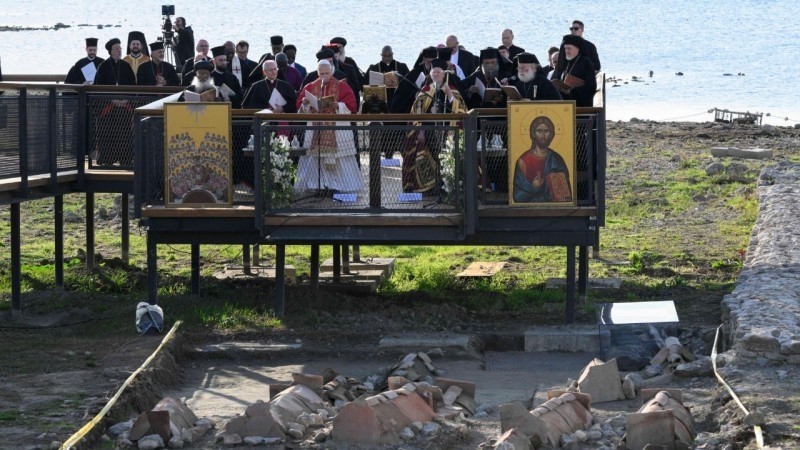 POPE LEO XIV’S NOVEMBER 2025 VISIT TO TÜRKİYE: A PUSH FOR ECUMENISM IN THE CONTEXT OF A SPIRITUAL JOURNEY
POPE LEO XIV’S NOVEMBER 2025 VISIT TO TÜRKİYE: A PUSH FOR ECUMENISM IN THE CONTEXT OF A SPIRITUAL JOURNEY
Mehmet Oğuzhan TULUN 12.01.2026 -
 TÜRKİYE’S MEDIATION IN THE UKRAINE-RUSSIA WAR
TÜRKİYE’S MEDIATION IN THE UKRAINE-RUSSIA WAR
Mehmet Oğuzhan TULUN 23.09.2024 -
 THE DISPUTE OVER THE ELECTION OF THE ARMENIAN PATRIARCH OF ISTANBUL CONTINUES
THE DISPUTE OVER THE ELECTION OF THE ARMENIAN PATRIARCH OF ISTANBUL CONTINUES
Mehmet Oğuzhan TULUN 27.02.2017
-
D.L. PHILLIPS’S DIPLOMATIC HISTORY OF THE TURKEY-ARMENIA PROTOCOLS (FULL TEXT)
Ömer Engin LÜTEM 02.04.2012 -
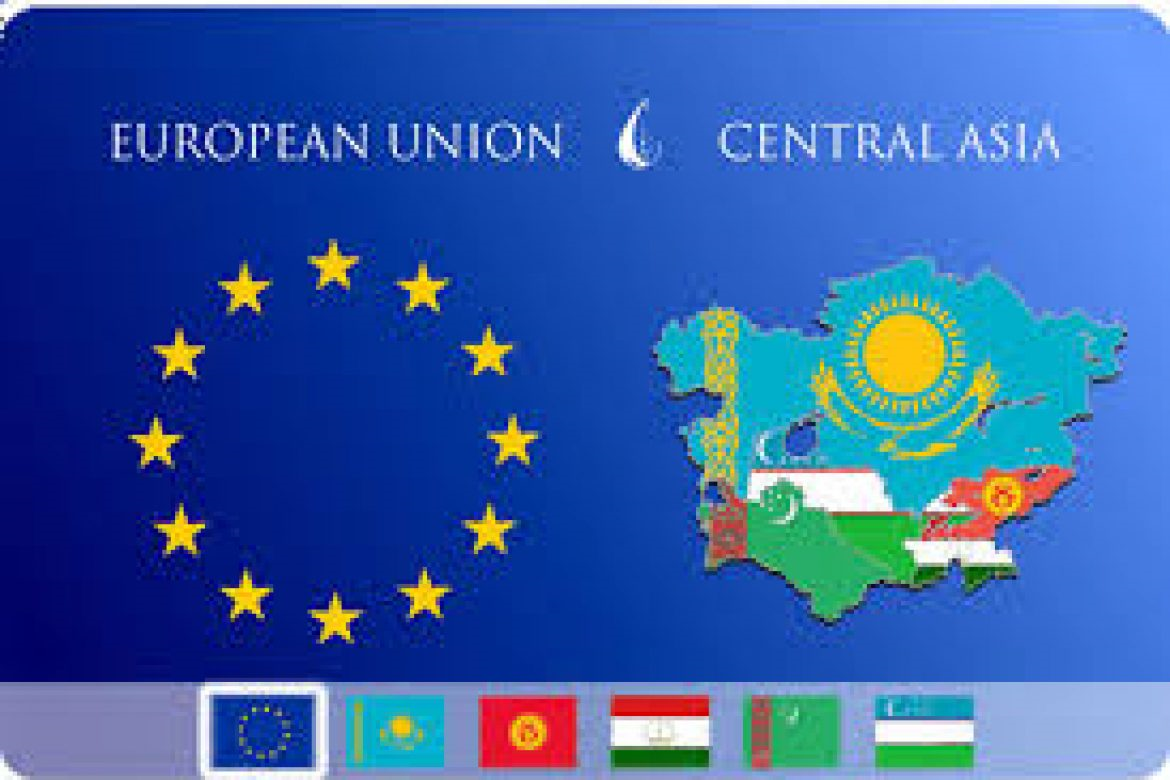 EU’S CENTRAL ASIA STRATEGY 2019: BELATED AND SELF CENTERED
EU’S CENTRAL ASIA STRATEGY 2019: BELATED AND SELF CENTERED
Teoman Ertuğrul TULUN 11.07.2019 -
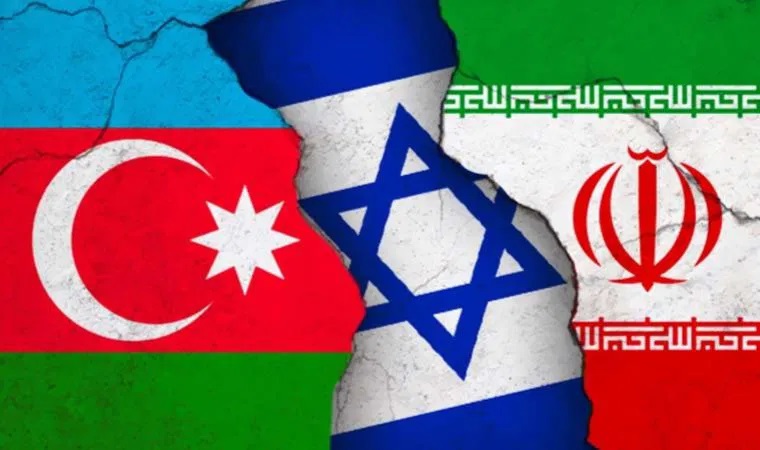 OVERLAPPING INTERESTS IN THE SOUTH CAUCASUS: THE AZERBAIJAN, ISRAEL AND IRAN TRIANGLE
OVERLAPPING INTERESTS IN THE SOUTH CAUCASUS: THE AZERBAIJAN, ISRAEL AND IRAN TRIANGLE
İlaha KHANTAMİROVA 29.05.2025 -
 THE GRAIN INITIATIVE AND THE BLACK SEA SECURITY - I
THE GRAIN INITIATIVE AND THE BLACK SEA SECURITY - I
Turgut Kerem TUNCEL 03.08.2023 -
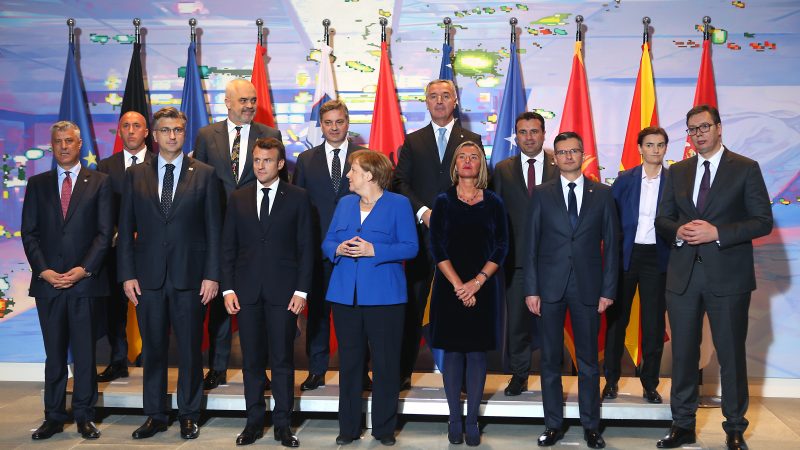 LEGACY OF "KRISENMANAGERIN": MERKEL AND THE BALKANS
LEGACY OF "KRISENMANAGERIN": MERKEL AND THE BALKANS
Teoman Ertuğrul TULUN 11.10.2021
-
25.01.2016
THE ARMENIAN QUESTION - BASIC KNOWLEDGE AND DOCUMENTATION -
12.06.2024
THE TRUTH WILL OUT -
27.03.2023
RADİKAL ERMENİ UNSURLARCA GERÇEKLEŞTİRİLEN MEZALİMLER VE VANDALİZM -
17.03.2023
PATRIOTISM PERVERTED -
23.02.2023
MEN ARE LIKE THAT -
03.02.2023
BAKÜ-TİFLİS-CEYHAN BORU HATTININ YAŞANAN TARİHİ -
16.12.2022
INTERNATIONAL SCHOLARS ON THE EVENTS OF 1915 -
07.12.2022
FAKE PHOTOS AND THE ARMENIAN PROPAGANDA -
07.12.2022
ERMENİ PROPAGANDASI VE SAHTE RESİMLER -
01.01.2022
A Letter From Japan - Strategically Mum: The Silence of the Armenians -
01.01.2022
Japonya'dan Bir Mektup - Stratejik Suskunluk: Ermenilerin Sessizliği -
03.06.2020
Anastas Mikoyan: Confessions of an Armenian Bolshevik -
08.04.2020
Sovyet Sonrası Ukrayna’da Devlet, Toplum ve Siyaset - Değişen Dinamikler, Dönüşen Kimlikler -
12.06.2018
Ermeni Sorunuyla İlgili İngiliz Belgeleri (1912-1923) - British Documents on Armenian Question (1912-1923) -
02.12.2016
Turkish-Russian Academics: A Historical Study on the Caucasus -
01.07.2016
Gürcistan'daki Müslüman Topluluklar: Azınlık Hakları, Kimlik, Siyaset -
10.03.2016
Armenian Diaspora: Diaspora, State and the Imagination of the Republic of Armenia -
24.01.2016
ERMENİ SORUNU - TEMEL BİLGİ VE BELGELER (2. BASKI)
-
AVİM Conference Hall 24.01.2023
CONFERENCE TITLED “HUNGARY’S PERSPECTIVES ON THE TURKIC WORLD"









